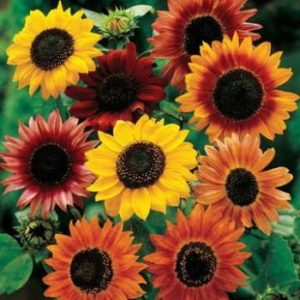Sunflower (Helianthus annuus)
Mixed sunflowers.;The word "sunflower" is borrowed from the Italian girasole, "which rotates with the sun". There are many names or vernacular expressions for it: great sun, garden sun, common sun, parrot seed, sunflower... The protein-rich seed is an excellent food source for birds and humans. Depending on the variety sown, your sunflower plants will bear a single large flower or several small ones.;Small varieties and very large varieties in a mixture.*The varieties included are subject to change
CARE AND OTHER CONSIDERATIONS: By the end of September, sunflower seeds are ripening. The stem dries up and the flowers bow their heads. It's time to harvest. Cut off the whole heads. They must then be dried in a dry place. Check often that the sunflower does not rot. After a few days, the seeds will sound "hollow" and "dry" when you run your fingernail over them. You just have to rub to remove the rest of the flowers, and scrape with your fingers to loosen the seeds.
| Characteristic: Tinctoriale |
| Quantity: Envelope of about 40 seeds |
| Plant type: Annual |
| Family: Asteraceae |
| Flower color: Yellow |
| Plantation: In the garden after the risk of frost |
| Sowing: Inside |
| Row spacing: 70 cm |
| Days to maturity: 55 days |
| Germination: 7 to 21 days |
| Plant spacing: 40 cm |
| Depth: 1 cm |
| Exposure: Full sun |
| Watering: Low water requirement |
| Soil: Rich |
| Width: 1 m |
| Height: 2 m to 3 m |

![[010] Arnica (Arnica chamissonis)](/web/image/product.product/741/image_128/%5B010%5D%20Arnica%20%28Arnica%20chamissonis%29?unique=5272a5f)
![[288] Hopi Black Dye Sunflower (Helianthus annuus)](/web/image/product.product/913/image_128/%5B288%5D%20Hopi%20Black%20Dye%20Sunflower%20%28Helianthus%20annuus%29?unique=c835eb5)
![[220] Mexican Tithonia (Tithonia rotundifolia)](/web/image/product.product/760/image_128/%5B220%5D%20Mexican%20Tithonia%20%28Tithonia%20rotundifolia%29?unique=30792f4)
![[140] Tagetes (Tagetes sp.)](/web/image/product.product/615/image_128/%5B140%5D%20Tagetes%20%28Tagetes%20sp.%29?unique=a9a83ba)